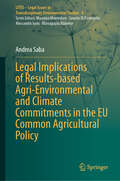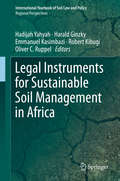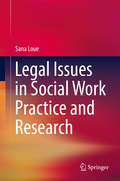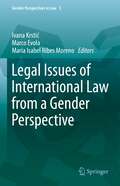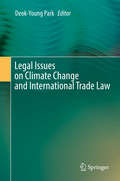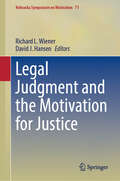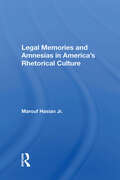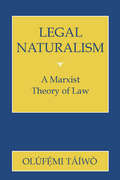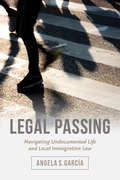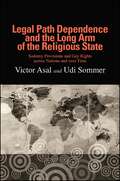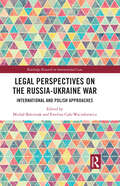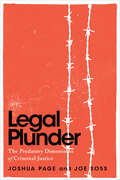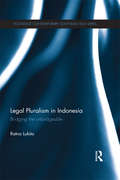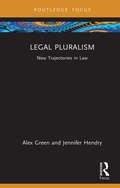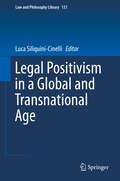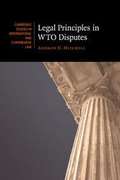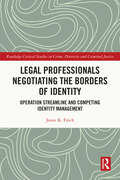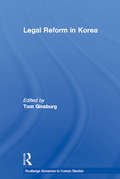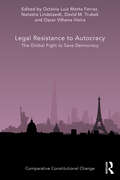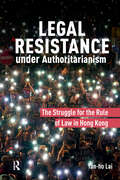- Table View
- List View
Legal Implications of Results-based Agri-Environmental and Climate Commitments in the EU Common Agricultural Policy (LITES - Legal Issues in Transdisciplinary Environmental Studies #4)
by Andrea SabaThis book offers essential insights into the policy and legal implications of the results-based approach in terms of shaping recent agri-environmental and climate commitments in the European Union and encouraging farmers to deliver significant and quantifiable enhancements of the quality of the environment within the EU Common Agricultural Policy. To do so, it addresses several cutting-edge questions: what is the current legal understanding of ecosystem services in the European Union? How has the ecosystem-based approach and its linkage with the multifunctional role of agriculture been recognised in EU agricultural law? How have agri-environmental and climate schemes evolved to adopt the results-based approach? To what extent is the Common Agricultural Policy’s new model encouraging farmers to deliver significant and quantifiable enhancements of the quality of the environment? What is the impact of the Common Agricultural Policy on EU actions concerning ecosystem and nature restoration? And lastly, what is the role of digitalisation and the AKIS in enhancing results-based agri-environmental and climate commitments in the EU? Given its scope, the book will be of interest to a wide readership of researchers, practitioners, professionals, students, and policymakers interested in agricultural law, rural development studies, ecosystem-based management, climate change, environmental studies, political science, and economics.
Legal Instruments for Sustainable Soil Management in Africa (International Yearbook of Soil Law and Policy)
by Harald Ginzky Oliver C. Ruppel Emmanuel Kasimbazi Hadijah Yahyah Robert KibugiThis book presents an important discussion on future options for sustainable soil management in Africa from various perspectives, including national soil protection regulations, the role of tenure rights, the work of relevant international institutions such as the UNCCD and FAO, and regional and international cooperation. This first volume of the new subseries Regional Perspectives to the International Yearbook of Soil Law and Policy includes contributions by African and international experts alike. Given the range of key topics covered, the book offers an indispensable tool for all academics, legislators and policymakers working in this field. The “International Yearbook of Soil Law and Policy – Regional Perspectives” series discusses central questions in law and politics that concern the protection and sustainable management of soil and land in different regions of the world.
Legal Issues in Social Work Practice and Research
by Sana LoueThis highly practical text surveys the myriad legal and ethical issues that social workers encounter both in daily practice and under special circumstances. Its initial section presents concepts in law and ethics that unite practitioners, researchers, and academics in the field, such as confidentiality, informed consent, and the interplay between social work and administrative and judicial systems. A selection of representative cases illustrates legal aspects involved in providing services to families, children, elders, and persons with disabilities. Also included are chapters on advocacy in social work, both in its potential to influence policy and on the global stage as part of the ongoing struggle for human rights and dignity.Among the topics covered:Confidentiality and the social worker-client relationshipLiability issues for social workers in the clinical contextLegal issues arising in the context of social work researchThe social worker and forensic social workSocial worker involvement in access to school and school servicesSocial work in the context of health careLegal issues working with immigrants, refugees, and asyleesThe interface between social work and human rightsLegal Issues in Social Work Practice and Research is an interdisciplinary text aimed at social work, mental health, and legal professionals. It enhances the power of social work as an integrative system to support clients’ rights and agency.
Legal Issues of International Law from a Gender Perspective (Gender Perspectives in Law #3)
by Ivana Krstić Marco Evola Maria Isabel Ribes MorenoThis book offers a new perspective on international law, which was, for centuries, male-dominant and gender-blind. However, this gender blindness has led to many injustices, the failure to recognize certain rights, and to impunity for serious crimes. The book examines the development of gender perspectives in various branches of international law, while also discussing and explaining certain universal standards. However, particular attention is paid to the European human rights system. Accordingly, the book provides detailed explanations of the EU’s external policies in relation to sex, sexual orientation, and gender identity. Also, there is a special focus on the relevant jurisprudence of the European Court of Human Rights in relation to gender and sexual orientation, female reproduction, and sexuality. The authors explain not only the importance of an adequate legal framework for combating gender inequality but also the detrimental effects of deeply rooted gender stereotypes and prejudices. Subsequently, the development of particular branches is presented, such as a gender-sensitive approach to the prevention of war crimes, gender perspectives in refugee law, and the evolution of gender-sensitive environmental law. In addition, the problematic situation of discrimination in the workplace is addressed from various perspectives. Many discussions, especially among EU member states, are reserved for the issue of women’s participation in managerial boards, while the growing awareness of gender equality in international trade agreements represents another interesting topic. Lastly, the book offers a historical perspective on the development of international law in the interwar period, with a particular focus on the situation in Yugoslavia. The book critically reconsiders the dominant molds of legal knowledge and presents innovative gender-sensitive and gender-competent insights on a variety of issues in international law, in order to introduce readers to new research topics relevant to gender equality and to stimulate the development of an international legal and institutional framework for achieving greater gender equality in practice. The collection of essays presented here will be of interest to all those working in the field of international law, as well as students and academics looking to broaden and deepen their research on a range of issues in international law from gender perspectives.
Legal Issues on Climate Change and International Trade Law
by Deok-Young ParkThis book provides anexcellent overview of the legal issues surrounding climate change mitigationand international trade law. It surveys key observed and potential challengesposed by responses to climate change in terms of international trade law. By examiningthe controversial issues seen in legal cases in which domestic climate changeor renewable energy measures conflicted with international trade regimes, thisvolume promotes and broadens the understanding and debate of the issues. Beyondthe recognized challenges, this book uncovers potential areas of conflictbetween climate change responses and international trade promotion by exploringprevious cases and current efforts to prevent climate change. Furthermore, thisvolume sheds light on the future direction of international trade law andclimate change responses, pointing out that the development of climate changeor renewable energy laws and policies must also consider international traderegimes in order to ensure the smooth implementation of said laws and policiesand guarantee that international trade laws do not restrict environmentalpolicy space.
Legal Judgment and the Motivation for Justice (Nebraska Symposium on Motivation #71)
by David J. Hansen Richard L. WienerThis volume takes as its point of departure that those who work in the area of law and psychology currently possess a great deal of knowledge about the psychology of the legal system, including the way in which the behavior of legislators, judges, jurors, attorneys, litigants, and defendants shapes the outcome of justice. It has also become very clear that the main obstacles to beneficial modifications to the legal system stem from the lack of motivation to seek justice, motivation to change legal process, and motivation to make use of evidence-based decision making. The purpose of this volume is to examine the antecedents of the motivation for justice, describe how that motivation activates and manifests in various legal institutions (i.e., elections, legislatures, courts, and executive offices), and trace the failure of that motivation to influence legal decision making. This will include research and commentary about a) where the motivation for justice comes from when people make legal judgments and decisions, b) how the motivation for justice influences legal judgments and decisions, and c) how legal judgments and decisions influence the motivation for justice in positive and negative ways. This topic is paramount at the current time in our history in view of the apparent breakdown of society&’s beliefs in our institutions and trust in the democratic process, which has contributed to a system that has increasingly operated from tribalistic impulse rather than from a richer motivation for authentic justice.
Legal Literacy: An Introduction to Legal Studies
by Archie ZariskiTo understand how the legal system works, students must consider the law in terms of its structures, processes, language, and modes of thought and argument—in short, they must become literate in the field. Legal Literacy fulfills this aim by providing a foundational understanding of key concepts such as legal personhood, jurisdiction, and precedent, and by introducing students to legal research and writing skills. Examples of cases, statutes, and other legal materials support these concepts. While Legal Literacy is an introductory text, it also challenges students to consider critically the system they are studying. Touching on significant socio-legal issues such as access to justice, legal jargon, and plain language, Zariski critiques common legal traditions and practices, and analyzes what it means “to think like a lawyer.” As such, the text provides a sound basis for those who wish to pursue further studies in law or legal studies as well as those seeking a better understanding of how the legal field relates to the society that it serves.
Legal Memories And Amnesias In America's Rhetorical Culture
by Marouf Arif HasianIn Legal Memories and Amnesias in America's Rhetorical Culture, Marouf Hasian, Jr. critically examines the rhetoric of law--specifically, the shifting lines between the notions of liberty and license. Hasian, Jr. explores how such issues as immigration, labor, national identity, race, and genetics have caused society to change how it thinks about, and uses, laws. In Legal Memories and Amnesias in America's Rhetorical Culture, Marouf Hasian, Jr. critically examines the rhetoric of law--specifically, the shifting lines between the notions of liberty and license. Hasian, Jr. explores how issues such as immigration, labor, national identity, race, and genetics have caused society to change how it thinks about, and uses, laws. The author builds on critical race theory, feminist studies of the law, and critical legal studies, and he uses a case study framework that covers topics such as Sarah Roberts and the separate but equal doctrine, John Brown's enactment of natural law at Harper's Ferry, Typhoid Mary Mallon, the Holocaust, Susan Smith, the human genome project, and Rosewood. All of the aforementioned are tied together by an introduction that clearly delineates the basic theoretical stance of the book. Without a doubt, the subject of this book is provocative, timely, and timeless.
Legal Mobilization Under Authoritarianism
by Waikeung TamLegal mobilization is the process by which individuals invoke their legal rights and use litigation to defend or develop these rights against the government. In recent years, increasing attention has been paid to this phenomenon as it occurs under authoritarian regimes. It is often suggested that, in such situations, legal mobilization is caused by the strategic interests of the ruling elites. Using the case study of post-colonial Hong Kong, where legal mobilization has by no means unfolded as political authorities would wish, Waikeung Tam casts doubt on this contention. To do so, he examines in depth why and how legal mobilization arises under authoritarianism. Tam analyses quantitative data of changes in the Hong Kong judiciary agendas over the last three decades and uses detailed interviews with activists, politicians, cause lawyers, judges and government officials to reveal the complex underlying socio-political forces at play.
Legal Naturalism: A Marxist Theory of Law
by Olufemi TaiwoLegal Naturalism advances a clear and convincing case that Marx's theory of law is a form of natural law jurisprudence. It explicates both Marx's writings and the idea of natural law, and makes a forceful contribution to current debates on the foundations of law. Olufemi Taiwo argues that embedded in the corpus of Marxist writing is a plausible, adequate, and coherent legal theory. He describes Marx's general concept of law, which he calls "legal naturalism." For Marxism, natural law isn't a permanent verity; it refers to the basic law of a given epoch or social formation which is an essential aspect of its mode of production. Capitalist law is thus natural law in a capitalist society and is politically and morally progressive relative to the laws of preceding social formations. Taiwo emphasizes that these formations are dialectical or dynamic, not merely static, so that the law which is naturally appropriate to a capitalist economy will embody tensions and contradictions that replicate the underlying conflicts of that economy. In addition, he discusses the enactment and reform of "positive law"--law established by government institutions--in a Marxian framework.
Legal Orientalism
by Teemu RuskolaAfter the Cold War, how did China become a global symbol of disregard for human rights, while the U. S positioned itself as the chief exporter of the rule of law? Teemu Ruskola investigates globally circulating narratives about what law is and who has it, and shows how “legal Orientalism” developed into a distinctly American ideology of empire.
Legal Passing: Navigating Undocumented Life and Local Immigration Law
by Angela S. GarcíaLegal Passing offers a nuanced look at how the lives of undocumented Mexicans in the US are constantly shaped by federal, state, and local immigration laws. Angela S. García compares restrictive and accommodating immigration measures in various cities and states to show that place-based inclusion and exclusion unfold in seemingly contradictory ways. Instead of fleeing restrictive localities, undocumented Mexicans react by presenting themselves as “legal,” masking the stigma of illegality to avoid local police and federal immigration enforcement. Restrictive laws coerce assimilation, because as legal passing becomes habitual and embodied, immigrants distance themselves from their ethnic and cultural identities. In accommodating destinations, undocumented Mexicans experience a localized sense of stability and membership that is simultaneously undercut by the threat of federal immigration enforcement and complex street-level tensions with local police. Combining social theory on immigration and race as well as place and law, Legal Passing uncovers the everyday failures and long-term human consequences of contemporary immigration laws in the US.
Legal Path Dependence and the Long Arm of the Religious State: Sodomy Provisions and Gay Rights across Nations and over Time
by Udi Sommer Victor AsalBringing together theoretical perspectives from both comparative politics and public law, this book examines the reasons why certain countries criminalize same-sex activities while others have carved into law the requirement that sexual minority communities be protected. The authors break new ground by using cross-national yearly data over decades—focusing on sodomy laws, death penalty provisions for same-sex sexual relations, and sexual discrimination practices—to develop a Gay Rights Index comparing treatment of such groups in various parts of the world. The book includes legal and large-N analyses, historical examples, and case studies underscoring important changes and key trends during the last several decades. Also highlighted are the significant human rights violations still being committed in various parts of the world against sexual minorities, and the continuing role religion plays.
Legal Perspectives on the Russia-Ukraine War: International and Polish Approaches (Routledge Research in International Law)
by Michał Balcerzak and Ewelina Cała-WacinkiewiczThis book critically examines the legal ramifications of Russia’s invasion of Ukraine and the aftermath of these events. Combining international and domestic perspectives, it synthesises nearly three years of legal responses to the aggression.Russia's aggression against Ukraine has triggered profound legal challenges with far-reaching implications for the states directly involved, third parties, and the international legal order. This book offers a comprehensive analysis of the international and domestic legal dimensions of the conflict. Beginning by exploring the international legal framework, including assessing the responses of the United Nations' system and key legal issues arising from the war. Exploring topics such as human rights, international humanitarian law, and the law of war, the book also analyses Poland’s response to the war, discussing the legislative and policy measures undertaken to address the impact of the crisis. Poland, Ukraine’s immediate neighbour, has played a pivotal role in managing the unprecedented influx of Ukrainian refugees and adapting its legal framework to the challenges posed by the war. The book uses Poland as a lens through which to examine the international legal response.This book will be of interest to researchers in the field of international law and human rights law.
Legal Plunder: The Predatory Dimensions of Criminal Justice (Chicago Studies in American Politics)
by Joe Soss Joshua PageA searing, historically rich account of how US policing and punishment have been retrofitted over the last four decades to extract public and private revenues from America’s poorest and most vulnerable communities. Alongside the rise of mass incarceration, a second profound and equally disturbing development has transpired. Since the 1980s, US policing and punishment have been remade into tools for stripping resources from the nation’s most oppressed communities and turning them into public and private revenues. Legal Plunder analyzes this development’s origins, operations, consequences, and the political struggles that it has created. Drawing on historical and contemporary evidence, including original ethnographic research, Joshua Page and Joe Soss examine the predatory dimensions of criminal legal governance to show how practices that criminalize, police, and punish have been retrofitted to siphon resources from subordinated groups, subsidize governments, and generate corporate profits. As tax burdens have declined for the affluent, this financial extraction—now a core function of the country’s sprawling criminal legal apparatus—further compounds race, class, and gender inequalities and injustices. Legal Plunder shows that we can no longer afford to overlook legal plunder or the efforts to dismantle it.
Legal Pluralism in Indonesia: Bridging the Unbridgeable (Routledge Contemporary Southeast Asia Series)
by Ratno LukitoWith the revival of Islamic law and adat (customary) law in the country, this book investigates the history and phenomenon of legal pluralism in Indonesia. It looks at how the ideal of modernity in Indonesia has been characterized by a state-driven effort in the post-colonial era to make the institution of law an inseparable part of national development. Focusing on the aspects of political and ‘conflictual’ domains of legal pluralism in Indonesia, the book discusses the understanding of the state’s attitude and behaviour towards the three largest legal traditions currently operative in the society: adat law, Islamic law and civil law. The first aspect is addressed by looking at how the state specifically deals with Islamic law and adat law, while the second is analysed in terms of actual cases of private interpersonal law, such as interfaith marriage, interfaith inheritance and gendered inheritance. The book goes on to look at how socio-political factors have influenced the relations between state and non-state laws, and how the state’s strategy of accommodation of legal pluralism has in fact largely depended on the extent to which those legal traditions have been able to conform to national ideology. It is a useful contribution for students and scholars of Asian Studies and Law.
Legal Pluralism: New Trajectories in Law (ISSN)
by Jennifer Hendry Alex GreenThis book examines the development and fundamental nature of legal pluralism. Legal pluralism evokes two distinctions: ‘state’ vs ‘non-state’ law; and ‘law’ vs ‘non-law’. As such, although this book focuses upon circumstances in which two or more legal orders compete to govern the same social space, it also addresses the nature of law in general. Drawing on material conflicts arising within jurisdictions such as Australia, Burundi, Cameroon, Gambia, the United States, and Zambia, this book explores the conceptual, moral, and political challenges that legal pluralism creates. Emphasising that non-state law carries no less dignity than that often ascribed to the legal orders of contemporary states, it advances a theoretically sophisticated argument in favour of recognising and respecting genuine cases of legal pluralism, wherever they arise. Accessible and thought provoking, this book will appeal to legal scholars, anthropologists, sociologists, and political and social philosophers as well as practising lawyers, judges, and policymakers who deal with issues of legal pluralism.
Legal Positivism in a Global and Transnational Age (Law and Philosophy Library #131)
by Luca Siliquini-CinelliA theme of growing importance in both the law and philosophy and socio-legal literature is how regulatory dynamics can be identified (that is, conceptualised and operationalised) and normative expectations met in an age when transnational actors operate on a global plane and in increasingly fragmented and transformative contexts. A reconsideration of established theories and axiomatic findings on regulatory phenomena is an essential part of this discourse. There is indeed an urgent need for discontinuity regarding what we (think we) know about, among other things, law, legality, sovereignty and political legitimacy, power relations, institutional design and development, and pluralist dynamics of ordering under processes of globalisation and transnationalism.Making an important contribution to the scholarly debate on the subject, this volume features original and much-needed essays of theoretical and applied legal philosophy as well as socio-legal accounts that reflect on whether legal positivism has anything to offer to this intellectual enterprise. This is done by discussing whether global and transnational cultural, socio-political, economic, and juridical challenges as well as processes of diversification, fragmentation, and transformation (significantly, de-formalisation) reinforce or weaken legal positivists’ assumptions, claims, and methods. The themes covered include, but are not limited to, absolute and limited state sovereignty; the ‘new international legal positivism’; Hartian legal positivism and the ‘normative positivist’ account; the relationship between modern secularisation, social conventionalism, and meta-ontological issues of temporality in postnational jurisprudence; the social positivisation of human rights; the formation and content of jus cogens norms; feminist critique; the global and transnational migration of principles of justice and morality; the Vienna Convention on the Law of Treaties rule of interpretation; and the responsibility of transnational corporations.
Legal Principles in WTO Disputes
by Andrew D. MitchellPrinciples play a crucial role in any dispute settlement system, and the World Trade Organization (WTO) is no exception. However, WTO Panels and the Appellate Body have been too timid in using principles, sometimes avoiding their use when appropriate and at other times using them without fully acknowledging that they are doing so. Perhaps more worryingly, these bodies often fail to delve deeply enough into principles. They tend to overlook key questions such as the legal basis for using a given principle, whether the principle is being used in an interpretative manner or as applicable law, and the meaning of the principle in public international law. This book establishes a framework for addressing these questions. The use of such a framework should allay fears and misconceptions about the use of principles and ensure that they are used in a justifiable manner, improving the quality of dispute settlement in the WTO.
Legal Professionals Negotiating the Borders of Identity: Operation Streamline and Competing Identity Management
by Jessie K. FinchThis book uses a controversial criminal immigration court procedure along the México-U.S. border called Operation Streamline as a rich setting to understand the identity management strategies employed by lawyers and judges. How do individuals negotiate situations in which their work-role identity is put in competition with their other social identities such as race/ethnicity, citizenship/generational status, and gender? By developing a new and integrative conceptualization of competing identity management, this book highlights the connection between micro-level identities and macro-level systems of structural racism, nationalism, and patriarchy. Through ethnographic observations and interviews, readers gain insight into the identity management strategies used by both Latino/a and non-Latino/a legal professionals of various citizenship/generational statuses and genders as they explain their participation in a program that represents many of the systemic inequalities that exist in the current U.S. criminal justice and immigration regimes. The book will appeal to scholars of sociology, social psychology, critical criminology, racial/ethnic studies, and migration studies. Additionally, with clear descriptions of terminology and theories referenced, students can learn not only about Operation Streamline as a specific criminal immigration proceeding that exemplifies structural inequalities, but also about how those inequalities are reproduced—often reluctantly—by the legal professionals involved.
Legal Reform in Korea (Routledge Advances in Korean Studies #Vol. 5)
by Tom GinsburgLaw in Korea has historically been viewed as merely a tool of authoritarian rule, but since the transition to democracy in 1987 it has served a more important and visible role as a force for social change. With contributions from leading US and Korean scholars, Legal Reform in Korea explores this response to domestic and international pressures, applying a socio-legal perspective to both legal practices and the legal institutions themselves, which have become a major political issue throughout the developing world. An invaluable resource for students of Asian law and Korean studies.
Legal Regulation of Private Actors in Outer Space: India’s Role
by Malay AdhikariThe book addresses legal issues and challenges in using Space Technology. Especially covered are the provisions of International Space Law and few national space legislations to regulate private actors in outer space. The key chapters covered are history of space regulations, private actors in space, legal issues for such actors, regulating these issues outside India, and the same in India. In concluding chapter, the author has worked out some recommendations.The book would be of immense use to people especially startups in private space industry; students, faculties and scholars of Space Law and Policy, Space Security, Defence and Security Studies.Please note: Taylor & Francis does not sell or distribute the Hardback in India, Pakistan, Nepal, Bhutan, Bangladesh and Sri Lanka
Legal Resistance to Autocracy: The Global Fight to Save Democracy (Comparative Constitutional Change)
by Octávio Luiz Motta Ferraz, Natasha Lindstaedt, David M. Trubek and Oscar Vilhena VieiraThis book focuses on resistance to autocratization, a less well-researched and understood topic than the rise of authoritarianism. As the editors and authors of this book have experienced both through their academic research and personal lives in autocratizing countries, autocratization does not march on unopposed. Moreover, resistance to autocratization has yielded results, if not managing to prevent attempted coups, like in Brazil and the United States, at least in disturbing the path of autocratizers and leaving doors open for future reversal, as in India, Israel and South Africa. This collection offers a contribution to this important yet neglected field from scholars of eight countries in different stages of autocratization: Brazil, India, China, Russia, Israel, Hungary, South Africa, and the United States, as well as cross-cutting themes on international human rights institutions, sanctions, the political economy of autocratization, and the role of lawyers from a comparative perspective. The authors include senior and rising scholars not only with academic interest and experience of the topic but also deep knowledge and intense involvement in the autocratization processes, and resistance, in their own countries. The volume will be of interest to researchers, academics, and policy-makers working in the areas of law, political science, and international relations.
Legal Resistance under Authoritarianism: The Struggle for the Rule of Law in Hong Kong
by Yan-ho LaiLegal Resistance Under Authoritarianism: The Struggle for the Rule of Law in Hong Kong examines the decline of Hong Kong’s rule of law under China’s expanding authoritarian influence. While the imposition of the National Security Law in 2020 is seen as a turning point, this book argues that threats to Hong Kong’s rule of law began with the 1997 sovereignty transfer. Drawing on comprehensive fieldwork, Yan-ho Lai explores the tensions between legal profession, political authorities and the state’s broader authoritarian project between the 2014 Umbrella Movement and the 2019 Anti-extradition Bill Movement. Highlighting resistance strategies employed by a critical minority of legal professionals, Lai reveals how their efforts played a crucial role in countering state encroachment. A compelling study of legal transplantation, legal resistance and the rule of law, this book sheds light on China’s influence beyond its jurisdiction, and Hong Kong’s uniqueness in global anti-authoritarian struggles.
Legal Resolution of Nuclear Non-proliferation Disputes
by James D. FryHow viable is the resolution of nuclear non-proliferation disputes through the International Court of Justice and international arbitration? James Fry examines the compromissory clauses in the IAEA Statute, IAEA Safeguards Agreements and the Convention on the Physical Protection of Nuclear Material that give jurisdiction to these fora and analyses recent jurisprudence to demonstrate how legal resolution can handle such politically sensitive disputes. In sum, legal resolution of nuclear non-proliferation disputes represents an option that States and commentators have all too often ignored. The impartiality and procedural safeguards of legal resolution should make it an acceptable option for target States and the international community, especially vis-à-vis the procedural shortcomings and general heavy-handedness of Security Council involvement under UN Charter Chapter VII.
